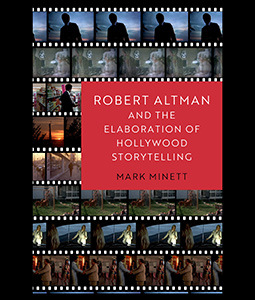
Robert Altman and the Elaboration of Hollywood Storytelling reveals an Altman barely
glimpsed in previous critical accounts of the filmmaker. This re-examination of his
seminal work during the "Hollywood Renaissance" or “New Hollywood” period of the early
1970s (including M*A*S*H, Brewster McCloud, McCabe & Mrs. Miller, Images, The Long
Goodbye, Thieves Like Us, California Split, and Nashville) sheds new light on both
the films and the filmmaker, reframing Altman as a complex, pragmatic innovator whose
work exceeds, but is also grounded in, the norms of classical Hollywood storytelling
rather than someone who rejected those norms in favor of modernist art cinema. Its
findings and approach hold important implications for the study of cinematic authorship.
Largely avoiding thematic exegesis, it employs an historical poetics approach, robust
functionalist frameworks, archival research, and formal and statistical analysis to
demystify the essential features of the standard account of Altman's filmmaking history
and profile—lax narrative form, heavy reliance on the zoom, sound design replete with
overlapping dialogue, improvisational infidelity to the screenplay, and a desire to
subvert based in his time in the training grounds of industrial filmmaking and filmed
television. The book provides a clear example of how a filmmaker might work collaboratively
and pragmatically within and across media institutions to elaborate upon their sanctioned
practices and aims. We misunderstand Altman's work, and the creative work of Hollywood
filmmakers in general, when we insist on describing innovation as opposition to institutional
norms and on describing those norms as simply assimilating innovation.
"Minett offers the most precise account we're likely to get of Robert Altman's unique
contributions to the art of American moviemaking. Covering the broad extent of his
career, including television work, Minett analyzes the achievement of this 'borderline'
Hollywood filmmaker with sensitivity to the changing production contexts. While mounting
original arguments, Minett revises, nuances, and challenges earlier work with persuasive
arguments and careful documentation. This book is at once an in-depth study of a distinctive
director and a revealing look at some unexpected cinematic horizons opened up by the
New Hollywood." -- David Bordwell, Jacques Ledoux Emeritus Professor of Film, University
of Wisconsin
"Minett's impressively extensive background research in Altman's technological and industrial options is combined with precise, perceptive analysis of some of the director's most popular films — all in clear, mercifully jargon-free prose. Tackling topics like Altman's fondness for zoom shots and dense, overlapping dialogue, Minett achieves a convincing account of the flexibility of the classical Hollywood cinema and the ingenuity with which Altman exploited that flexibility." -- Kristin Thompson, co-author of The Classical Hollywood Cinema: Film Style & Mode of Production to 1960